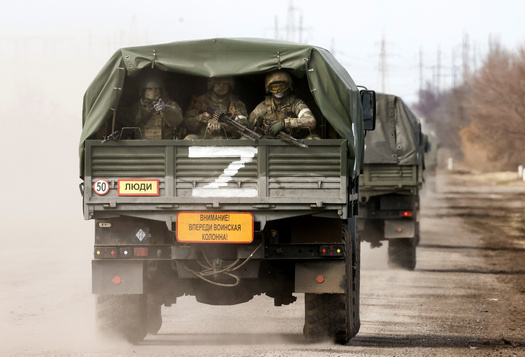
‘Refusing to kill people isn’t a crime’ The Russian National Guard is firing officers who refuse to join the war in Ukraine.
Мы рассказываем честно не только про войну. Скачайте приложение.
On March 24, Pavel Chikov, a lawyer from the international human rights organization Agora, reported that 12 Russian National Guard officers from Krasnodar who were participating in military exercises in Crimea had refused to follow their commander’s orders to join the war in Ukraine. The officers were subsequently fired, though they’ve challenged the decision in court and are seeking to have their employment reinstated. Meduza spoke with Krasnodar-based lawyer Mikhail Benyash, who’s representing the officers in court, about the case and its possible consequences.

— When and under what conditions were your clients fired?
— On February 25, [Rosgvardia, the Russian National Guard] was getting ready to send my clients to Ukrainian territory, but they refused to leave Crimea. A review was initiated. On March 1, they received contract termination orders due to their failure to carry out orders. They thought about it and decided to go through the courts to get their employment reinstated. 12 people have reached out to us so far, but a lot more have been fired.
— Are there legal grounds for reinstatement? To what degree were they required to take part in the “special military operation?”
— If there was an armed conflict, an emergency situation, or martial law, the terms of the contract could be changed without their consent for six months. But we don’t have an armed conflict or a war, it’s just a “special military operation.” The law doesn’t say anything about that. You can go there [as a Rosgvardia officer], but only if you agree to it.
— Beautiful.
— The authorities themselves refuse to call it an armed conflict. Whatever category you choose, that’s what you’ll get. That means everyone who goes there must agree — there’s no point threatening them. And if it is a military conflict, another question immediately arises: who started it? Oops. And nobody wants to answer this question, since there’s a completely different qualification of the actions [in the Russian Criminal Code] — and I don’t mean the soldiers’ actions. That’s why they won’t recognize what’s happening as an armed conflict.
— Have there been attempts to put pressure on the objectors?
— They’ve been feeling more pressure from the publicity — it’s really difficult for them. These people have gone their whole lives in masks and helmets, and now their names are out there. It’s very traumatic for them. Despite the fact that they’ve done something a portion of society really approves of, other people are harassing them.
— So if your clients manage to get their employment reinstated, is it possible that this will set a precedent, and that other contract officers will start refusing to take part in the “special military operation” en masse?
— They’re already refusing en masse. It’s just that they used to be afraid that what they were doing was illegal. And now they’ll know there’s a legal basis for this.
— Were your clients expecting media attention and the strong reaction they’ve gotten from the public and from their superiors?
— I told them there would be some hype [on the local level]. But I’d say the result has surprised me and shocked them.
— Are administrative charges used to discourage these kinds of refusals?
— In our case, they’ve been scared off by the publicity. But with other soldiers from other cities, they use charges to pressure them. Deputy officers, special department. They scare them with [charges of] “betraying the Motherland.” But they’re all bark. It’s purely to scare them.
— Can you give an estimate of the scale of the refusal?
— I’m hearing from people all over the country, from Siberia to the North Caucasus.
— Why there, exactly?
— They want to hear from the person who’s going to court. That means I must know what’s allowed and what’s not.
— So the wave of messages came after you got started helping the Rosgvardia officers.
— Yes.
— Can you give an estimate of the number of requests you’ve gotten?
— In the range of 200. One person generally reaches out on behalf of a group and asks whether they can get their jobs in the service back. I tell them that from a legal perspective, they should be able to. But given what’s going on here in Russia, we’ll have to see.
— What’s motivating the officers who refuse to take part in the “special military operation?”
— It’s very simple. People don’t want to kill or to be killed. When they first got hired, their contracts were about something slightly different. On top of that, Rosgvardia worked differently. These guys can’t shoot surface-to-air missiles, they can’t operate tanks. What are they going to do against a trained army? And with what, a club and a shield? Their job is to disperse Navalny supporters, and they’ve done a great job at that. This is something different.
I want other officers to know: refusing to kill people isn’t a crime. It’s not shameful. It’s all right. If someone says no to an order that requires him to kill someone, he can fully count on our protection. Me and the lawyers from Agora will defend him.
— Aren’t you scared they’ll start pressuring you, too?
— What, do you think I haven’t been pressured by them before? Two weeks ago, they kicked my door down. You should see what they did to it. It’s like a hippopotamus chewed it up.
Interview by Vladimir Sevrinovsky
Translation by Sam Breazeale
(1) What do you mean?
Article 353 of the Russian Criminal Code establishes criminal liability for the "planning, preparation, and launching of an aggressive war," punishable by up to 20 years in prison. "Oops" is right.